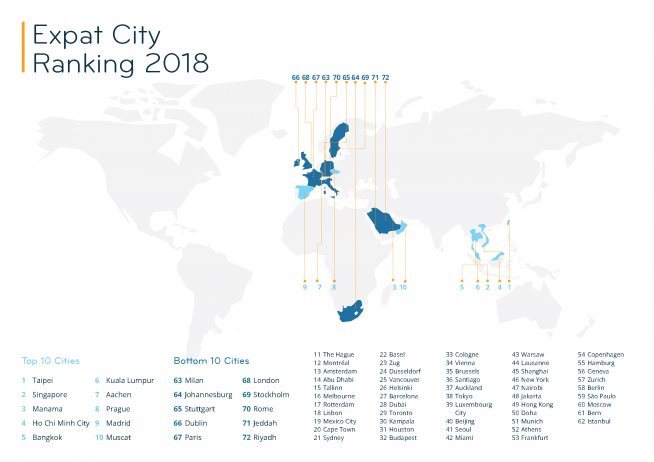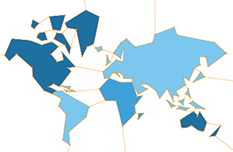The Best & Worst Cities for Expats in 2018
- #1 Taipei receives top 5 results across all indices.
- #2 Singapore does particularly well for quality of urban living.
- #3 Manama comes first for getting settled.
- Rome joins two Saudi Arabian cities in the bottom 3.
- Asian cities make up half of the top 10, while European metropolises dominate the bottom 10.
Methodology
As part of the Expat Insider 2018 survey, participants were also asked to rate more than 25 different aspects of urban life abroad on a scale of one to seven. The rating process emphasized respondents’ personal satisfaction with these aspects. The individual factor ratings were bundled in various combinations for a total of 13 subcategories, and their mean values were used to draw up four topical indices: Quality of Urban Living, Getting Settled, Urban Work Life, and Finance & Housing. These were further averaged to rank 72 cities worldwide. The additional Local Cost of Living Index is not included in the overall city ranking to avoid overrepresenting financial aspects.
In total, the responses used for the city ranking represent 11,966 expats living in 55 countries. For a city to be featured in the Expat City Ranking 2018, a sample size of at least 45 survey participants per city was required; 72 cities in 47 different countries made this threshold in 2018.
Taipei Scores across the Board
New in the Expat City Ranking in 2018, Taipei makes it straight to the top. The city receives top 5 results across all indices and even ranks first for the quality of urban living. According to a British respondent, it is “more relaxed and less stressful than other cities, such as Hong Kong or New York”.
In no other city are expats more satisfied with the availability, affordability, and quality of medical care, as well as local transportation and their personal safety. In fact, not a single respondent has something negative to say about the latter two factors, while over nine in ten expats in Taipei regard the local healthcare services positively. A US American respondent in the city explicitly praises the “access to affordable, multi-faceted healthcare”.
Respondents are similarly happy with their urban work life: Taipei ranks second in this index, only beaten by Aachen in Germany. Over four in five respondents in Taipei (84%) are satisfied with their job, nearly 20 percentage points more than the global average of 65%. They are also much more likely to rate their work-life balance (78% vs. 61% globally) and their job security (72% vs. 59%) favorably.
There are very helpful and friendly people who always find a solution for whatever problem one might have.
Expats also appreciate how easy it is to get settled in Taipei: the city ranks third in this index, even coming first for both the general friendliness of the local population and the friendly attitude towards foreign residents. Not a single respondent in Taipei is dissatisfied with the latter, compared to a global average of 21%, and 94% rate the general friendliness positively (vs. 62% worldwide). A Swiss respondent particularly appreciates the “very helpful and friendly people who always find a solution for whatever problem one might have”. What is more, expats in Taipei are the happiest regarding their social life (77% positive ratings vs. 57% globally) and the ease of making new friends (79% vs. 46%).
Even better, Taipei ranks fourth in the Finance & Housing Index. Over three-quarters (77%) are satisfied with their financial situation; with 37%, more than double the global average (18%) even give it the best possible rating. This may well be related to the local cost of living, which is rated favorably by 72%, compared to 44% of the respondents around the globe. Overall, close to nine in ten expats in Taipei (89%) agree that their disposable household income is enough or even more than enough to cover their daily expenses. Close to a quarter (23%) even thinks it is a lot more than they need.
While results regarding the affordability and ease of finding housing are not quite as excellent, Taipei still does quite well in this regard, too: 70% agree that it is easy for expats to find housing (vs. 52% globally), and 47% rate their housing costs favorably (vs. 37%). Overall, Taipei’s great results mirror those of Taiwan, which ranks 2nd out of 68 countries and territories in 2018.
Singapore Kept (Slightly) Back by Long Hours & High Costs
Another newcomer, runner-up Singapore scores top 10 ranks for quality of urban living (4th) and getting settled (10th) but can’t quite keep up regarding urban work life (25th). Nevertheless, expats in Singapore appreciate the state of the local economy, with half of them (50%) even giving it the best possible rating. However, they are less happy with their local career opportunities (49th) and work-life balance (48th). With an average of 45.5 hours a week, expats in Singapore spend noticeably more time at the job than the global average (40.8 hours).
All the work at least seems to pay off: with a share of 55%, expats in Singapore are much more likely to have an annual gross household income of 100,000 USD or more, compared to 24% of expats worldwide. Three in ten (30%) even have a yearly household income of over 200,000 USD, five times the global average of 6%.
This might also explain why the city-state ranks 8th for finance, despite a 50th place in the Local Cost of Living Index. “Housing and the cost of living in general are way too expensive,” according to a Dutch respondent, and others agree: close to three in five (59%) rate the affordability of housing in Singapore negatively. Contrary to many European cities where housing is similarly expensive, respondents in Singapore at least do not find it particularly difficult to find housing, ranking the city-state ninth for this factor.
It also doesn’t seem too difficult to get by without local language skills (6th) or to get used to the local culture (12th) in Singapore, either. Thanks to these results, as well as good ratings across the board, Singapore places 10th out of 72 cities in the Getting Settled Index.
It is easy for anyone and everyone to live and enjoy life here without worrying about safety.
Singapore does even better in the Quality of Urban Living Index, coming in fourth place. The city delights expats with a very high level of personal safety (98% positive ratings), quality healthcare (84%), and excellent local transportation (95%). “The public transport is top notch,” according to an Australian respondent, and an Indian expat appreciates that “it is easy for anyone and everyone to live and enjoy life here without worrying about safety”. In fact, less than 1% of the respondents in Singapore had something negative to say about their personal safety.
Manama First for Getting Settled Abroad
2017’s winner Manama also makes it into the global top 3 in 2018. Once again, the capital of Bahrain receives its best results in the Getting Settled Index, where it has even improved further to rank 1st out of 72 cities in 2018. Over seven in ten respondents (72%) find it easy to get used to the local culture, and 46% agree completely with this statement — more than double the global average of 20%. Similarly, expats in Manama very much feel at home in the city (74% positive responses vs. 62% globally), have few problems finding new friends (67% vs. 46%), think that the local population is friendly towards foreign residents (87% vs. 62%), and are generally happy with their social life (74% vs. 57%). A German respondent points out the “warmth and friendliness of the people. They are always helpful.”
Career opportunities and growth worry me the most, as there is a limitation.
Expats in Manama are not quite as unanimous regarding their satisfaction with urban work life. While nearly twice the global average (47% vs. 24%) give their working hours the best possible rating, and over eight in ten (81%) are generally satisfied with their job (vs. 65% globally), respondents are less likely to regard their local career opportunities (42nd) and the state of the city’s economy (57th) favorably. As an Indian respondent puts it: “Career opportunities and growth worry me the most, as there is a limitation.”
Respondents in Manama benefit from easy-to-find (2nd) and affordable (13th) housing, though. Expenses in general are not something expats in Manama worry about a lot: 57% rate the local cost of living favorably, 13 percentage points more than the overall average of 44%. Just 13% are not satisfied with their financial situation in general, compared to a quarter (25%) globally. Consequently, Manama ranks sixth for finance and housing.
Ranking 50th in the Quality of Urban Living Index, Manama receives its worst result by far in this regard. Respondents are especially dissatisfied with their local transportation options, with close to three in ten (28%) giving this factor a negative rating, compared to 19% globally. “I don’t like the poor public transportation,” an Italian respondent shares. Manama also ranks somewhat below average in the Leisure & Climate (39th), Health & Environment (44th), and Safety & Politics (46th) subcategories.
The Bottom 3 Cities for Expats
Like the country, which places second to last in 2018, Saudi Arabian cities do not score well, either: Riyadh comes last, followed by Jeddah. Both cities are featured in the bottom 3 of the Quality of Urban Living Index, ranking 72nd and 70th respectively. Most expats in Riyadh (60%) and Jeddah (51%) are, for example, unhappy with the local leisure options, compared to 13% of all respondents. “The leisure and entertainment opportunities are scarce, especially if one is living alone without family,” shares a Pakistani respondent in Riyadh. A similar percentage of expats (61% and 55%, respectively) voice their dissatisfaction with the local transportation in both cities, which is around three times the global average of 19%.
The leisure and entertainment opportunities are scarce, especially if one is living alone without family.
Results in the Getting Settled and Urban Work Life Indices are not much better: while Riyadh ranks 70th for both, Jeddah places 68th and 69th, respectively. About half the respondents do not feel at home in Jeddah (48%) or Riyadh (54%), nor are they happy with their social life (46% and 52%, respectively). Both destinations are also listed among the bottom 10 cities for every rating factor contributing to the Urban Work Life Index. However, expats in these Saudi Arabian cities at least do not struggle financially: with 88% and 82% in Jeddah and Riyadh, respectively, a higher-than-average share of respondents (78%) say their disposable household income is enough or even more than enough to cover all living expenses. The affordability and availability of housing also receives above-average results, with Jeddah ranking 22nd and Riyadh coming in 26th place out of 72 cities in this subcategory.
Rome joins Riyadh and Jeddah in the bottom 3. The Italian capital places last in the Urban Work Life Index, with respondents being especially dissatisfied with their local career opportunities (58% negative ratings vs. 27% globally), their job in general (38% vs. 18%), and the state of the local economy (58% vs. 14%). The latter might also be one of the reasons for the respondents’ dissatisfaction with their financial situation (40% negative ratings vs. 25% globally). Rome does not perform much better in the Quality of Urban Living Index, where it ranks 65th out of 72. More than half the expats in Rome (56%) are dissatisfied with the local transportation, and 42% regard the quality of the urban environment negatively. Even Rome’s great results for the local weather — 58% regard it as excellent — cannot really make up for this.
What Has Happened to 2017’s Top 3?
The 2017 number one, Manama, has successfully defended a spot on the podium, though the two newcomers Taipei and Singapore have relegated it to third place in 2018. The previous year’s runner-up Prague and third-placed Madrid, on the other hand, have both dropped a few more ranks but are still listed in the global top 10 with an eighth and ninth rank, respectively. Both cities receive ratings similar to their results in 2017; however, they have been pushed down by four newcomers as well as a few other cities with improved ratings.
Geographical Trends in the Top & Bottom 10
Not only do Asian cities rank first (Taipei) and second (Singapore) in 2018, but they also make up half of the global top 10, with Ho Chi Minh City (4th), Bangkok (5th), and Kuala Lumpur (6th) following not far behind. All five do very well in the Finance & Housing Index, with top 5 ranks for all but Singapore, which lands on 14th place due to expensive housing (47th for this factor). Similarly, these cities do quite well in terms of getting settled, with results in this index ranging from Taipei’s 3rd place to Bangkok ranking 22nd — any differences here are partly due to varying results for the ease of learning the respective local language.
Apart from Riyadh and Jeddah coming in last and second-to-last place, the bottom 10 are dominated by European cities. Next to Rome (70th), there are Stockholm (69th), London (68th), Paris (67th), Dublin (66th), Stuttgart (65th), and Milan (63rd). They all score badly regarding finance & housing, with Rome’s 53rd place the best result in this index — Dublin and Stockholm even rank last and second to last, respectively. Most of these European cities do not do particularly well in the Getting Settled Index, either, with Stuttgart placing last of all 72 cities. The lone exception here is Dublin, which ranks 20th. Results for the Urban Work Life Index are much more varied, ranging from Stuttgart’s sixth place to Rome coming last.
Further Reading
- Expat Insider 2018 — Working Abroad: Cities to Go For and Cities to Avoid
- Expat Insider 2018 — From Sun to Healthcare: Cities with the Best Quality of Urban Living
- Expat Insider 2018 — Cities for the Budget-Conscious Expat
- Expat Insider 2018 — Homely, Friendly, Few Language Barriers: Cities for Getting Settled
- Expat Insider 2018 — The Best & Worst Countries for Expats
- Expat Insider 2018 — Sun in One Asian Tiger, Rain in Another
- Expat Insider 2017 — The Best (and Worst) Cities for Expats in 2017




